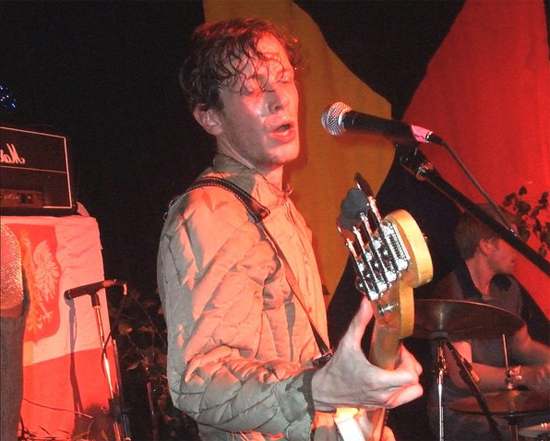"So what type of music do they play?"
I’m struggling here. I’m struggling to explain who British Sea Power are, what it is they sound like and why it is they mean so much to those that follow them to, if not the end of the earth, then certainly the end of Britain. They’re due onstage any second, I’ve stupidly told loads of people that the best live band around are playing our town, and now I’m proving exactly why it is I’ll always be a bottom feeder in this business of music, why I’ll never get invited on The Late Review or see a picture of my smug face atop 500 words of pretentious waffle about The XX for The Sunday Times.
"They’re a rock band. They’re very British."
"Oh."
"Yeah, but British in a good way. I’m not talking about bullshit patriotism. Theirs is a semi-mythical Britain that surveys the topography of an unobtainable Arcadia. Their music is littered with signs and signifiers of a changing world – collapsing ice shelves, flooded islands – and their name is a tongue-in-cheek nod to the colonial power of old, but they’re not imperialists. They’re definitely not that. They’re more like musical flâneurs. Or the Famous Five. I suppose really they’re creating their own fantasy world in this era of uncertainty. Plus, they like nature and camping and stuff."
I’m met with blank looks and raised eyebrows.
"Ri-iii-ght…"
I’m thinking about all this and how every now and again, maybe once a decade, a band comes along who articulate something that you thought only you felt, or they validate your decision to act, live, dress and think a certain way. For many – myself included – British Sea Power are that band.
I’m thinking about all this as they shuffle onto the small stage of the Trade’s Club, a co-operatively run venue that’s nestled up close to the Leeds-Liverpool canal in a town with a rich history of… otherness. It’s a place with deep-rooted left-wing politics, a thriving environmental culture, a vibrant gay scene (per capita Hebden Bridge, is the gay capital of Britain), plus many individualists, artistic enclaves, bearded men and drizzle. And though it’s no Arcadia – as documented in Jez Lewis’ recent documentary Shed Your Tears And Walk Away – it’s as free and tolerant a place as any that you would find on this island of ours.
And this is important because if British Sea Power stand for something, it is freedom and romance. Freedom to wear what you want (and tonight bassist Hamilton is in an all in-one beige puffer jumpsuit, his brother Yan an orange cagoule), release the music you want, roam wherever your body’s compass takes you and romanticise the mundane to make life truly worth living. And British Sea Power’s music is one of the reasons I left the chaos of London to return here to the North to pursue such a romanticised rural idyll in a hamlet just a mile or two’s walk through the pitch black woods that border this town.
Opening tonight with downbeat ‘A Wooden Horse’ is an odd decision, but it’s a false beginning, a trick to remind just how loud and intense British Sea Power can be – how new psychedelic punk tune ‘Can We Do It?’ sounds like PiL laconically tearing through 13th Floor Elevators obscurities, or just how exactly ‘kW-H’ achieves the improbable feat of creating a new genre: rural-glam. Or maybe farmyard disco. Elsewhere ‘Carrion’ remains the most breathless coastal musical sweep – all that’s missing is a crane camera shot and Neil Oliver emoting in a tumbledown folly – and ‘A Trip Out’ an uplifting, clarion call for the workers; a hyper-harvest song for the post-industrial epoch.
It is songs like these that tap into the psyche of a Britain that doesn’t realise it’s greatest strength has always been its diversity, a point that was completely lost on the canvassing BNP dipshits I found myself arguing with last week. Because British Sea Power’s music looks outwards rather than inwards because – as they sing – "We’re all in it." Their mental borders are open to all-comers, their journey never-ending, from the Eastern Europe of ‘Waving Flags’, to ancient Greece (maybe) on ‘Zeus’, across the cosmos on ‘Bear’ and finally reaching the Valhalla Dancehall of their forthcoming album. Their musical boundaries are non-existent too as they skip between differing genres that all fall into a sweaty heap under the woefully inadequate description of ‘rock music’. They close with ‘Remember Me’, a song I’d happily have played at my funeral – not so much for the sentiment as the internal surge of joy it unleashes every time I hear it.
The Britain we inhabit for ninety minutes tonight is far from broken. Nor is it Great in the imperialist sense either. It is better than that: it is a dream, a vision, a paradise of sorts. Reality once removed. On very rare occasions music still has that power to take us there.



